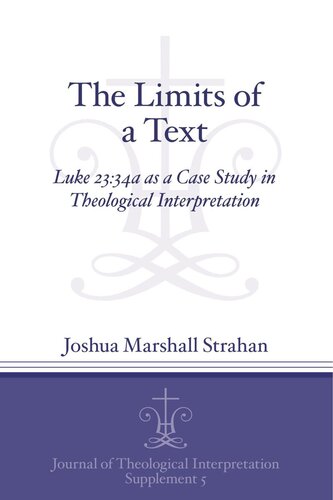

Most ebook files are in PDF format, so you can easily read them using various software such as Foxit Reader or directly on the Google Chrome browser.
Some ebook files are released by publishers in other formats such as .awz, .mobi, .epub, .fb2, etc. You may need to install specific software to read these formats on mobile/PC, such as Calibre.
Please read the tutorial at this link: https://ebookbell.com/faq
We offer FREE conversion to the popular formats you request; however, this may take some time. Therefore, right after payment, please email us, and we will try to provide the service as quickly as possible.
For some exceptional file formats or broken links (if any), please refrain from opening any disputes. Instead, email us first, and we will try to assist within a maximum of 6 hours.
EbookBell Team

5.0
38 reviewsHow does one limit a biblical text? Can one limit it? Should one? These questions drive one to examine core assumptions of biblical interpretation, assumptions about the aims and attitudes one brings to the task of reading the Bible. Is the aim of biblical exegesis to uncover what really happened, to discover the author’s intentions, to attend to the interpretations of readers—ancient and/or contemporary? Furthermore, should the interpreter approach biblical texts from a position of neutrality, suspicion, and/or faith?
Strahan’s book aims to offer a (not the) set of answers to these questions by bringing historiographical theory, hermeneutical theory, and theology into conversation, a conversation centered around a case study that deals with limiting the meaning(s) of an enigmatic Gospel text: “Father, forgive them, for they know not what they do” (Luke 23:34a). Borrowing insight from Augustine’s De Doctrina Christiana, this book offers a renewed, ecclesially located strategy for dealing with polysemy in biblical texts, a strategy that holds together many of the strengths offered by contemporary theological interpreters.